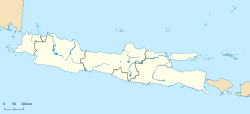
The Sultanate of Mataram was the last major independent Javanese kingdom on the island of Java before it was colonised by the Dutch. It was the dominant political force radiating from the interior of Central Java from the late 16th century until the beginning of the 18th century.

Pesantren is a traditional Islamic boarding school in Indonesia. It is thought either in private houses, a pondok or a mosque, the teaching includes classical Islamic texts and santri thought, taught by kyais. According to one popular tradition, the pesantren education system originated from traditional Javanese pondokan, dormitories, ashrams for Hindus or viharas for Buddhists to learn religious philosophies, martial arts, and meditation. Institutions much like them are found across the Islamic world and are called pondok in Malaysia, Southern Thailand and madrasas in India and Pakistan and much of the Arabic-speaking world. The pesantren aims to deepen knowledge of the Quran, particularly through the study of Arabic, traditions of exegesis, the Sayings of the Prophet, law and logic. The term pesantren derives from the root word santri or student -- pe-santri-an or the place of the santri.

A kyai is an expert in Islam. This denomination is usually used among the ethnic Javanese people.

In Indonesia, santri is a term for someone who follows Islamic religious education in pesantren. Santri usually stay in the place until their education is complete. After completing their study period, some of them will serve the pesantren by becoming administrators. According to C.C. Berg, the term "santri" comes from Sanskrit shastri which means "one who learns Hindu scriptures"; it has the same root as the word shastra (literature).

Martapura is the capital of the Banjar Regency in South Kalimantan province, Indonesia. It is located close to the city of Banjarbaru and it consists of three districts within the Regency - Martapura, West Martapura and East Martapura, with a combined population at the 2020 Census of 169,356 people; the official estimate as at mid 2023 was 174,876.

Untung Suropati also Untung Surapati was a warfighter in the East Indies who led a few rebellions against the Dutch East India Company (VOC). Some of his exploits were written in Babad Tanah Jawi.
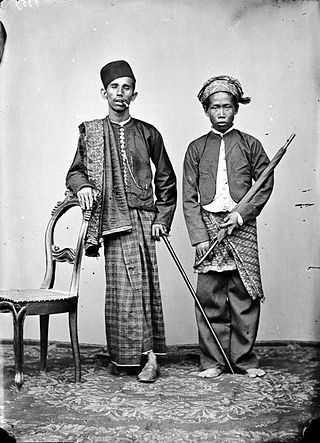
Kapitan Arab or Kapten Arab or Head of The Arabs is a position in the colonial Dutch East Indies appointed with the task of leading the ethnic Arab-Indonesians, who usually lived in concentrated clearly defined-living areas. The role was to provide liaison between his community and the government, to provide statistical information to The Dutch East Indies government on issues related to Arabs, to disseminate government regulations and decrees, and to ensure the maintenance of law and order.
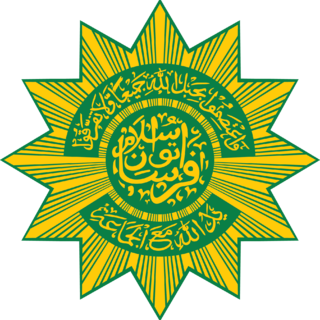
Persatuan Islam is an Islamic organization in Indonesia founded on 12 September 1923 in Bandung by a group of Muslims who are interested in education and religious activities led by Haji Zamzam and Haji Muhammad Yunus.
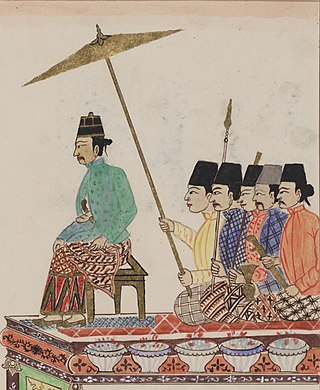
Amangkurat III was a short-lived susuhunan (ruler) of the Sultanate of Mataram, who reigned 1703–1705.

The eastern salient of Java is a region that makes up the easternmost part of the island of Java, Indonesia. It is not a formal or administrative subdivision, but rather a designation often used to refer to its distinct history, culture, and geographical feature. It is generally considered to begin in the Tengger mountain range and extend eastwards to the east coast of Java. It is entirely contained by the Indonesian province of East Java.

Islam is the most common religion in the Indonesian province of East Java, embraced by 96.7% of the whole population. Throughout its history, East Java has been considered one of the heartlands of Islam in Indonesia; the province experienced one of the earliest proliferations of Islam, as well as the establishment of the largest Islamic mass organization in Indonesia, Nahdlatul Ulama.

Drs. Kyai Hajji Habib Ali Alwi bin Thohir Al Husainy is an Indonesian politician, da'i, Islamic scholar and founder of the Pondok Pesantren Modern Al-Husainy, Serpong, South Tangerang, Banten. At the election of regional head and deputy regional head of Tangerang Regency in 2008, Alwi was nominated by the Democrat Party and the National Awakening Party as a candidate for vice regent along with Usamah Hisyam as a candidate for regent, but this pair was defeated by incumbent candidate Ismet Iskandar with Rano Karno as his deputy. Currently, Alwi serves as a senator representing the province of Banten in the Regional Representative Council.

Greater Malang is a region in East Java, Indonesia, encompassing the municipality of Malang and its hinterland. About 3 million people in East Java reside in Greater Malang. The principal city, Malang is well known as the home of notable universities in Indonesia, and the nearby Batu, is well known as a tourism centre in East Java.
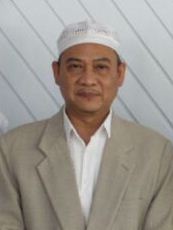
Abuya Kyai Hajji Uci Turtusi bin Dimyati, better known as Abuya Uci, was an influential Indonesian Muslim cleric and preacher from Banten. Uci was the leader of the Pondok Pesantren Salafiyah Al-Istiqlaliyah Cilongok who succeeded his father, Abuya Dimyati bin Romli, who died in early 2001. The Pesantren was founded in 1957 by Abuya Dimyati, an influential cleric in the Tangerang Regency.

Veryal Eisha Aqila Zulfikar Basyaiban or better known as Veve Zulfikar is an Indonesian religious singer, actress, and brand ambassador. In addition, she is also an Indonesian young qāriʾah who is often invited to various provinces in Indonesia to recite verses of the Quran at various religious events. Since 8 October 2016, Veve Zulfikar joined YouTube and began uploading content as she recited the verses of the Quran, sang the salawat and qasida, also shared her daily activities. On 26 July 2017, Veve released her first single, entitled Sepercik Do'a Cinta, which was created by her father, Zulfikar Mohammad Basyaiban.

Kyai Hajji Zubair Dahlan was an Indonesian ulama of tafsir, fiqh, uṣūl al-fiqh, and tasawwuf from Rembang Regency, Central Java. Every year, in the month of Ramadan, Zubair always routinely teaches the Tafsir al-Jalalayn to his students. In addition, he also active in teaching branches of Arabic grammar and tawhid at the Pesantren Sarang. Zubair is the father of an influential cleric in Indonesia, Maimun Zubair, and a teacher of several Nahdlatul Ulama cleric such as Sahal Mahfudz, Bisri Syansuri, and others. Some of his students later became caregivers and leaders of famous pesantren in Indonesia, such as Pondok Pesantren Lirboyo, Pondok Pesantren Sidogiri, Pondok Pesantren Al-Falah Ploso, Pondok Pesantren Mranggen, and other pesantren.
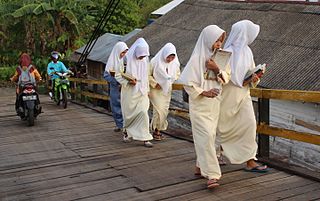
Kota santri is an epithet used in Indonesia, predominantly in Java, given to a region historically important in the context of Islamic education. The term santri generally means a Muslim student who studies at pesantren, an Islamic boarding school indigenous to the Indonesian archipelago.
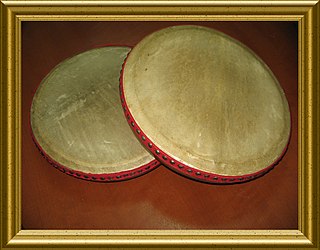
Kompang is a traditional Balinese and Javanese musical instrument part of gamelan in the percussion family originated from the Indonesian region of Ponorogo in East Java. Kompang has existed in Indonesia since at least the 8th century and has spread to various regions of Indonesia as well as the Southeast Asia in general, such as Singapore, Malaysia, Brunei and Thailand, which later became known as Kompang Jawa.
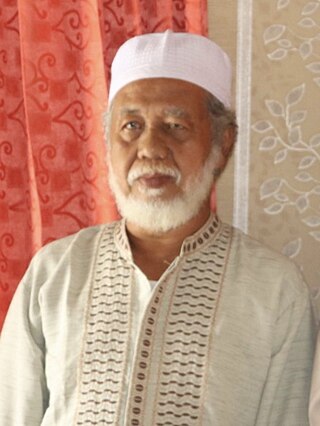
Abuya Kyai Hajji Muhammad Murtadho bin Dimyathi al-Bantani or better known as Abuya Murtadho is an Indonesian Muslim cleric from Banten. He is an influential Bantenese cleric whose character is often used as a reference for politicians to visit his residence, including figures from political parties, the police, high-ranking institutions, even presidential and vice-presidential candidates.

Indonesian Arabic is a variety of Arabic spoken in Indonesia. It is primarily spoken by people of Arab descents and by students (santri) who study Arabic at Islamic educational institutions or pesantren. This language generally incorporates loanwords from regional Indonesian languages in its usage, reflecting the areas where it is spoken.

